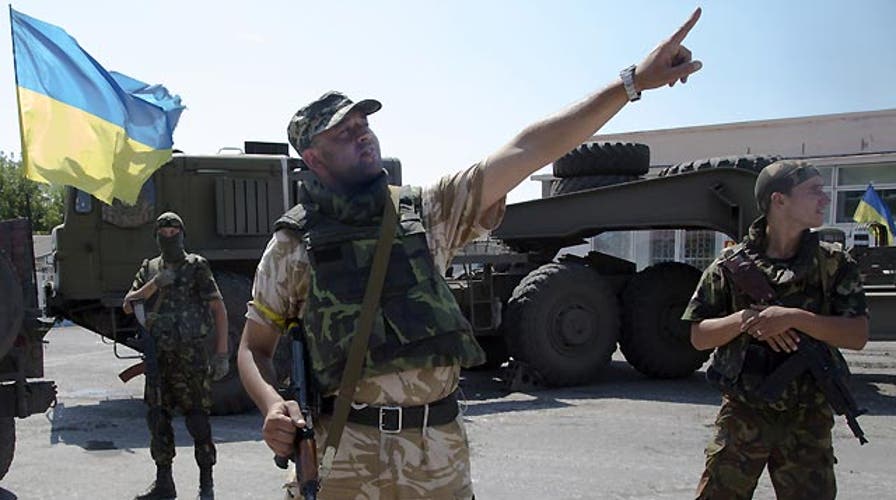Ukraine rejects rebels' truce, calls for complete surrender
James Kirchick, fellow with The Foreign Policy Initiative, weighs in
DONETSK, Ukraine – As Kiev tightened the vise on the separatist stronghold of Donetsk, surrounding the eastern city and cutting off supply routes and all roads in, the Kremlin floated plans to send a "humanitarian" convoy through to help embattled pro-Russian insurgents.
With the pro-Russian separatists facing continuous pressure in the now largely deserted city that once held 1 million people, rebel commander Igor Strelkov, also known as Igor Girkin, said the 5,000 separatists running the city are now on their own. Although some rebels are calling for a cease-fire in order to spare the city from being destroyed by Ukrainian shelling, others vowed that, if invaded, Donetsk will become “another Stalingrad,” a reference to the bloody 1942 battle in which Russians repelled Nazi forces to help turn the tide of World War II.
But word that Moscow, which has already sent 20,000 troops to the border, just two hours east of Donetsk, could send help could signal the two sides are in for a long standoff. In doing so, Russian President Vlaidimir Putin would be defying previous warnings from the West that such a move would be seen as provocative. Shortly after the Kremlin statement was released, in the form of a readout of a telephone call between Putin and European Commission chief Jose Manuel Barroso, the office of Ukrainian President Petro Poroshenko announced he was on a call with President Obama.
Residents continue to leave the city, and on Sunday, the city’s only train station was the scene of intense jostling for tickets to Kiev and other major cities. Those who remain in the city will be forced to seek shelter from the ongoing assault or join the separatist ranks.
According to one local source, some people leaving Donetsk en route to Kiev have been taken off trains and detained before reaching Kiev, in order to prevent separatists from escaping, and reaching the nation's capital. It is also possible that the artillery shelling could destroy the rail lines altogether.
Sporadic shelling has continued throughout the weekend, damaging buildings and shutting down electricity and water in some parts of the city. An additional assault by Ukrainian forces could prove to be the death knell of the separatist movement.
But even though Ukrainian forces have the upper hand, approximately 20,000 Russian troops have amassed just across the border, some two hours east. Russian President Vladimir Putin, who has brazenly armed and equipped pro-Russian forces through the conflict, could possibly have the final say in how the current situation unfolds.
Should Putin ignore separatists pleas to intervene, Ukraine can try to wait them out with the city surrounded or force the issue with an invasion that could end the standoff quickly, but at a tremendous toll. After the weekend, it was clear that most residents were not sticking around to see which option plays out.
Also Monday, a Ukrainian security spokesman denied rebels’ claims that government forces fired a rocket that exploded inside a high-security prison in Donetsk, causing a riot and more than 100 inmates to escape, including some jailed for murder and rape. Rebels routinely accuse government forces of using heavy artillery in their campaign to retake Donetsk. But Ukrainian security spokesman Andriy Lysenko blamed the prison strike on separatist fighters.
"Bandits in Donetsk shelled residential quarters and correctional facility No. 124," he said.
The New York Times reported that Sunday saw the government's most intensive bombardment yet of Donetsk as rebel strongholds in three districts of the city were targeted. According to city council spokesman Maxim Rovinsky, at least one person was killed and 10 injured in shelling overnight, as more than 10 residential buildings, a hospital and a shop were heavily damaged in the fighting.

